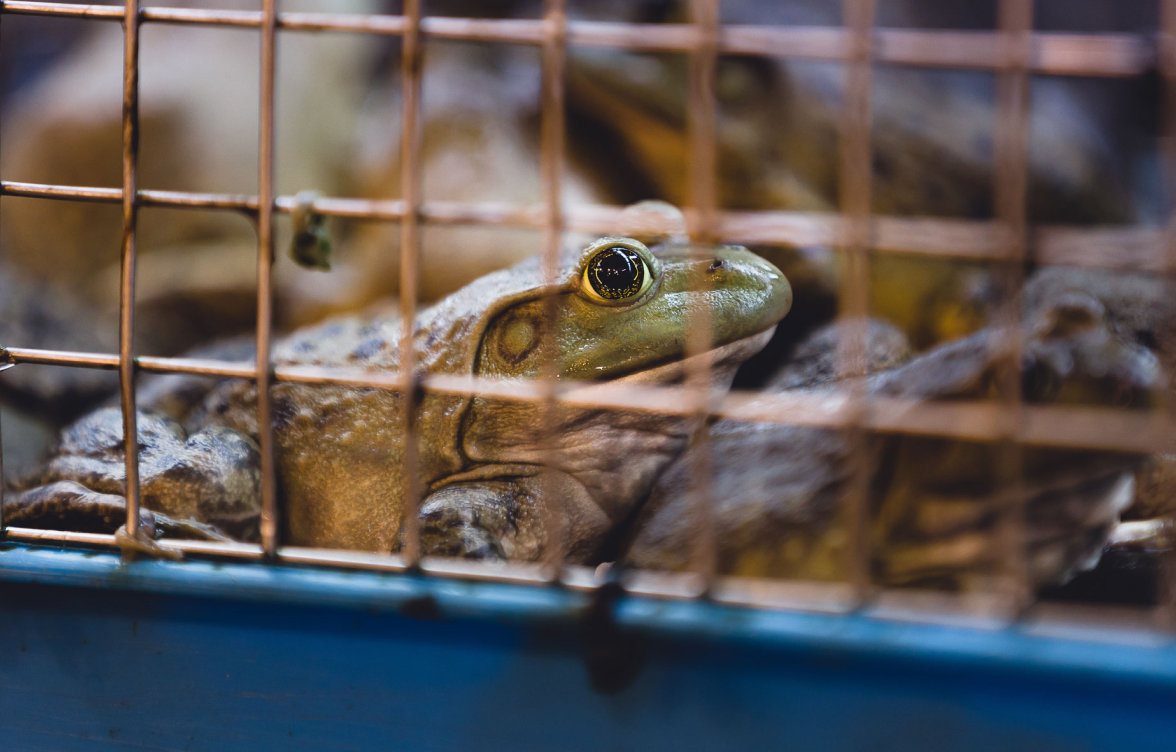
Conservation Corner
Responding to Wildlife Trafficking
The Aquarium serves as a sanctuary for animals seized from wildlife traffickers, including a recent pair of axolotls.
Species that are designated endangered, threatened, or protected in some manner need our help to survive. At the Aquarium of the Pacific, we are committed to the protection and recovery of these animals.
Most of our guests and members are familiar with how the Aquarium is contributing to the recovery of protected species with our breeding and head start programs. The Aquarium is currently helping white abalone, mountain yellow-legged frogs, and southern sea otters and has a history (and future) of working with many other species. Additionally, as needed, Aquarium staff members assist in the rescue and rehabilitation of animals found in distress in the wild, such as green sea turtles.
What many may not know is the Aquarium also serves this aid role for animals rescued by law enforcement from wildlife traffickers. Many species, including those that are protected under the Endangered Species Act, are not allowed to be traded or kept as pets. When law enforcement identifies a violation of these rules, the animals are confiscated. Often discovery occurs during travel, at airports, border crossings, and ports. Animals can be in a state of distress or poor health and require specialized care. Law enforcement then calls on zoos, aquariums, and other animal care organizations to assist.
The Aquarium of the Pacific is one that answers the call. We are a part of the Southern California Wildlife Confiscations Network, a partnership between the U.S. Fish and Wildlife Service and 19 animal care partners in the region. Launched in 2023, the network provides a coordinated system to ensure the care and welfare of confiscated wildlife. This network operates under the Wildlife Trafficking Alliance, which is a national program of the Association of Zoos and Aquariums (AZA).
The Wildlife Trafficking Alliance is a coalition of over 90 nonprofit organizations, companies, and AZA-accredited zoos and aquariums, working together to combat illegal wildlife trade around the world.
Wildlife trafficking is a significant problem both nationally and globally. In 2022 the U.S. Fish and Wildlife Service investigated over 10,000 wildlife trafficking cases. Globally, there are millions of incidents. Wildlife trafficking not only contributes to the decimation of species in the wild, but also fuels criminal networks, destabilizes governments, encourages corruption, and threatens human and animal health through the transmission of diseases.
A recent example of the Aquarium’s response involved a pair of axolotls. In April 2023 California Department of Fish and Wildlife confiscated two juvenile axolotls. They were very young and in poor health upon arrival, including one missing a leg.
Aquarium staff members worked intensively to revive them, including hand feeding multiple times a day, extensive water changes, and closely monitoring other environmental factors. We did this work behind the scenes, in quarantine, as we do for all new arrivals to the Aquarium to protect the rest of our animals against any potential diseases. The pair was successfully restored to health last summer, and guests will be able to see them when our FROGS: Facing a Changing World exhibition opens.
The Aquarium responds to these types of incidents only a few times a year, and most often the animals do not become permanent residents with us. It’s rare that the animals go back to nature since law enforcement often does not know where the animals were collected from, the animals have been habituated when kept illegally as pets, or other factors which prevent their release. Nonetheless we are happy to serve a role to rehabilitate these important individuals and care for them before they move to their permanent home.
You too can assist with averting wildlife trafficking. Not all animals make good pets. Amphibians face particularly high illegal trade as pets. Do your research prior to adopting a new companion to avoid inadvertently contributing to this global problem. Some simple steps can make a big difference.
- Look up the protected status of the species with a simple Google search.
- Make your purchase through a reputable vendor.
- Ask the vendor where the animal came from. If they cannot tell you, refrain from the purchase.

Jennie Dean
Jennie Dean is the Aquarium’s inaugural vice president of education and conservation. She focuses on the amplification and enhancement of the Aquarium’s work in species conservation and learning for all audiences. Previously Dean was a program director at the University of California, Los Angeles’ Institute of the Environment and Sustainability, where she oversaw programs engaging the private sector on corporate sustainability and consulted with island governments on sustainable development of their blue economy.